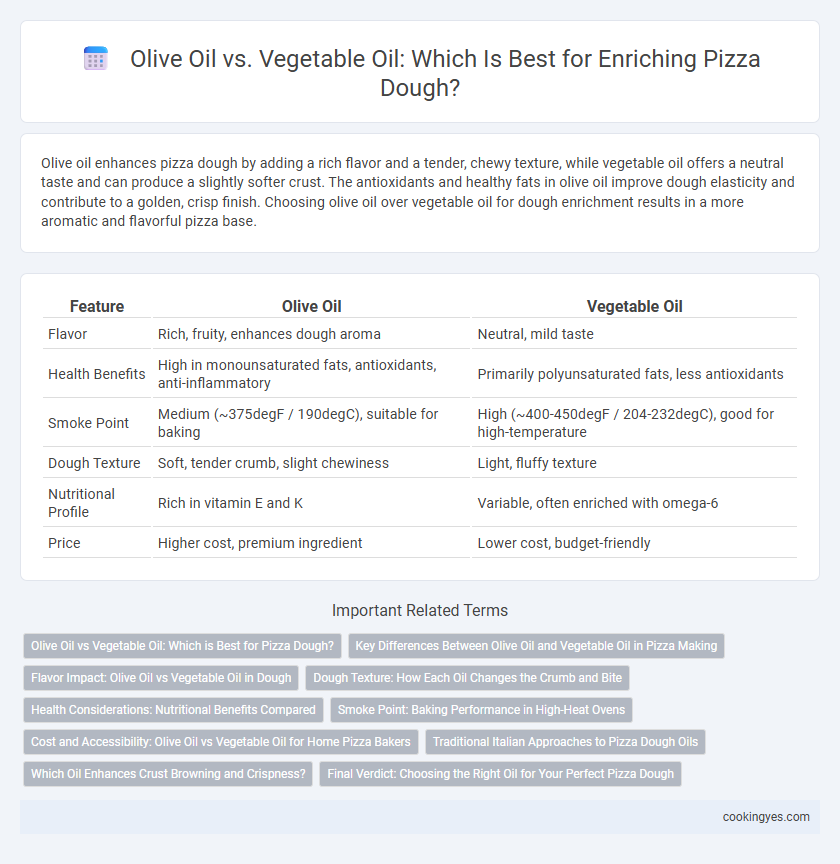Olive oil enhances pizza dough by adding a rich flavor and a tender, chewy texture, while vegetable oil offers a neutral taste and can produce a slightly softer crust. The antioxidants and healthy fats in olive oil improve dough elasticity and contribute to a golden, crisp finish. Choosing olive oil over vegetable oil for dough enrichment results in a more aromatic and flavorful pizza base.
Table of Comparison
| Feature | Olive Oil | Vegetable Oil |
|---|---|---|
| Flavor | Rich, fruity, enhances dough aroma | Neutral, mild taste |
| Health Benefits | High in monounsaturated fats, antioxidants, anti-inflammatory | Primarily polyunsaturated fats, less antioxidants |
| Smoke Point | Medium (~375degF / 190degC), suitable for baking | High (~400-450degF / 204-232degC), good for high-temperature |
| Dough Texture | Soft, tender crumb, slight chewiness | Light, fluffy texture |
| Nutritional Profile | Rich in vitamin E and K | Variable, often enriched with omega-6 |
| Price | Higher cost, premium ingredient | Lower cost, budget-friendly |
Olive Oil vs Vegetable Oil: Which is Best for Pizza Dough?
Olive oil enhances pizza dough with a rich, fruity flavor and improves texture by creating a tender, crispy crust, while vegetable oil offers a neutral taste and slightly lighter crumb. Nutritionally, olive oil provides beneficial monounsaturated fats and antioxidants compared to the often refined polyunsaturated fats in vegetable oil. For authentic Italian pizza dough, olive oil is preferred due to its flavor profile and health advantages, making it the best choice for enriching dough.
Key Differences Between Olive Oil and Vegetable Oil in Pizza Making
Olive oil, rich in monounsaturated fats and antioxidants, enhances pizza dough by adding a distinct, fruity flavor and improving texture with a tender crumb and crisp crust. Vegetable oil, typically composed of neutral-tasting polyunsaturated fats, does not impart much flavor but produces a softer dough, often preferred for a chewier consistency. The key differences lie in olive oil's pronounced flavor profile and health benefits versus vegetable oil's neutrality and higher smoke point, influencing both taste and baking performance in pizza making.
Flavor Impact: Olive Oil vs Vegetable Oil in Dough
Olive oil enhances pizza dough with a rich, fruity aroma and slightly peppery notes, contributing to a more complex and authentic Mediterranean flavor profile. Vegetable oil, often neutral in taste, allows the natural dough and toppings to shine without adding distinct flavors, resulting in a milder overall taste. Choosing olive oil intensifies the savory experience, while vegetable oil maintains a subtler, cleaner dough base.
Dough Texture: How Each Oil Changes the Crumb and Bite
Olive oil enhances pizza dough by creating a tender, chewy crumb with a slightly crisp exterior due to its high monounsaturated fat content. Vegetable oil, typically higher in polyunsaturated fats, tends to produce a softer, less elastic dough with a finer crumb and milder bite. The choice between olive oil and vegetable oil significantly influences dough hydration, gluten development, and the overall mouthfeel of the finished pizza crust.
Health Considerations: Nutritional Benefits Compared
Olive oil is rich in monounsaturated fats and antioxidants, which contribute to heart health and reduce inflammation, making it a superior choice for pizza dough enrichment compared to vegetable oil. Vegetable oil typically contains higher levels of omega-6 fatty acids and lacks the beneficial polyphenols found in olive oil, potentially promoting oxidative stress when consumed in excess. Choosing olive oil not only enhances flavor but also provides essential nutrients that support cardiovascular health and overall well-being.
Smoke Point: Baking Performance in High-Heat Ovens
Olive oil, with a smoke point around 375degF to 420degF, offers moderate heat tolerance, contributing rich flavor and slightly crisp texture to pizza dough in high-heat ovens. Vegetable oil typically has a higher smoke point, ranging from 400degF to 450degF, allowing better stability and less risk of burning during baking, which promotes evenly cooked, tender crusts. Selecting the right oil based on smoke point optimizes dough performance, texture, and flavor development under intense baking temperatures.
Cost and Accessibility: Olive Oil vs Vegetable Oil for Home Pizza Bakers
Olive oil, known for its rich flavor and health benefits, tends to be more expensive and less accessible than vegetable oil, which is widely available at a lower cost. Vegetable oil, often made from soy, corn, or canola, provides a neutral taste and affordability, making it a practical choice for home pizza bakers on a budget. Cost-effectiveness and easy availability of vegetable oil support its frequent use in dough enrichment without sacrificing texture.
Traditional Italian Approaches to Pizza Dough Oils
Traditional Italian pizza dough recipes often favor extra virgin olive oil for its robust flavor and health benefits, enriching the dough with antioxidants and monounsaturated fats. Olive oil enhances the dough's elasticity and browning, contributing to the classic chewy texture and golden crust characteristic of authentic Neapolitan pizza. In contrast, vegetable oil lacks the distinctive aroma and subtle bitterness of olive oil, making it a less favored choice in traditional Italian pizza dough preparation.
Which Oil Enhances Crust Browning and Crispness?
Olive oil enhances crust browning and crispness more effectively than vegetable oil due to its higher content of monounsaturated fats and natural antioxidants like polyphenols, which promote Maillard reactions during baking. The distinct flavor profile of olive oil also contributes to a richer, more complex crust taste and texture. Vegetable oil, being more neutral and lower in antioxidants, tends to produce a softer crust with less pronounced browning.
Final Verdict: Choosing the Right Oil for Your Perfect Pizza Dough
Olive oil enhances pizza dough with a rich, fruity flavor and contributes to a tender, crisp crust due to its high monounsaturated fat content. Vegetable oil offers a neutral taste and can make the dough softer but lacks the depth of flavor olive oil provides. For authentic, flavorful pizza dough, olive oil is the optimal choice, balancing taste and texture perfectly.
Olive oil vs Vegetable oil for dough enrichment Infographic

 cookingyes.com
cookingyes.com